Artificial intelligence has three significant incomes for the insurance business. It helps better engage with the audience, facilitate sales, and optimize operational time & cost. Moreover, it makes the policyholder’s life easier by streamlining the customer experience, taking less effort to choose and manage insurance products.
Find out how AI is transforming the insurance industry and how the technology will evolve for the business in the near future.
The gap between technology pioneers in insurance and traditional agencies is deepening. For example, traditionally, it takes about a week to process standard customer applications. At the same time, Haven Life company does it in 20 minutes, using their online questionnaire. Today's success in insurance directly depends on technology adoption, as customers have already appraised the benefits of a tech-savvy experience.
Another striking example of AI impacting insurance is internal workflow automation with machine learning and RPA (robotic process automation). It helps companies reduce the expenses of routine work (paperwork, manually written notifications, follow-ups, etc.) and focuses employees on more strategic, creative tasks. For instance, Fukoku Mutual Life Insurance company replaced 34 full-time employees with artificial intelligence. As a result, it helped boost its productivity by 30% and save up to $1.25 million during the first year of using AI.
The future of insurance services fueled by AI potential looks highly promising. For example, imagine the car reporting a claim itself after a car accident, sending all required data from sensors to your insurer, describing the nature of the damage. After analyzing the collected data, an automated estimation algorithm sends you the repair cost and the amount of compensation upon your policy.
Another scenario of the future is property damage like a water leak detected by sensors at home. The remote water switch-off can minimize the damage caused by a leakage. It works great for both sides: policyholders keep their homes safe from severe destruction, while the insurers get minimum claim costs.
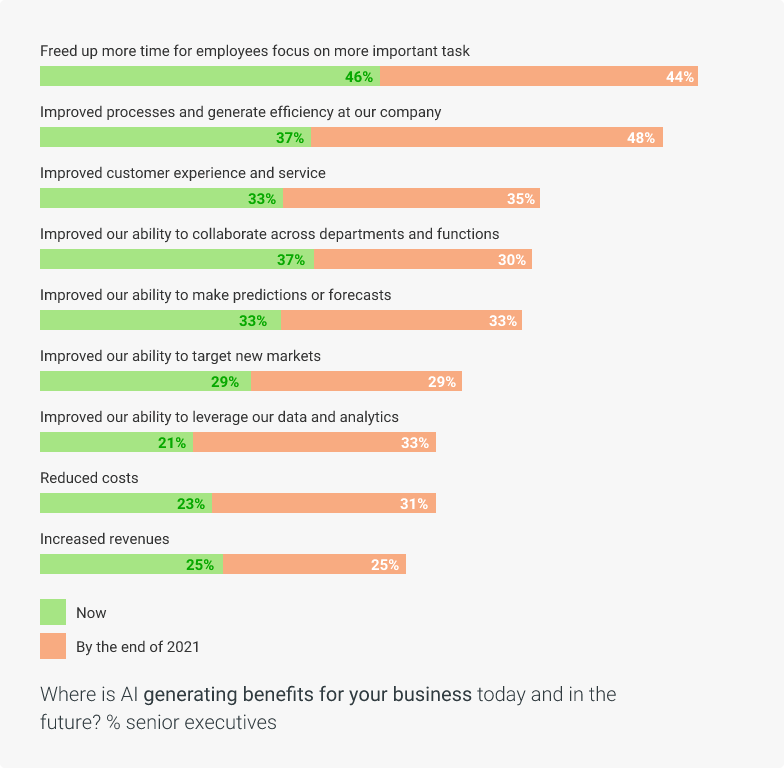
The Benefits for Insurance Generated by AI Adoption (Source: genpact.com)
According to McKinsey, 25% of the insurance industry will be automated by 2025. AI can save about $390 billion for the companies through the front, back, and middle office optimizations by 2030. The interest in advanced AI technologies grows across the industry. Therefore, the amount of investment grows respectively.
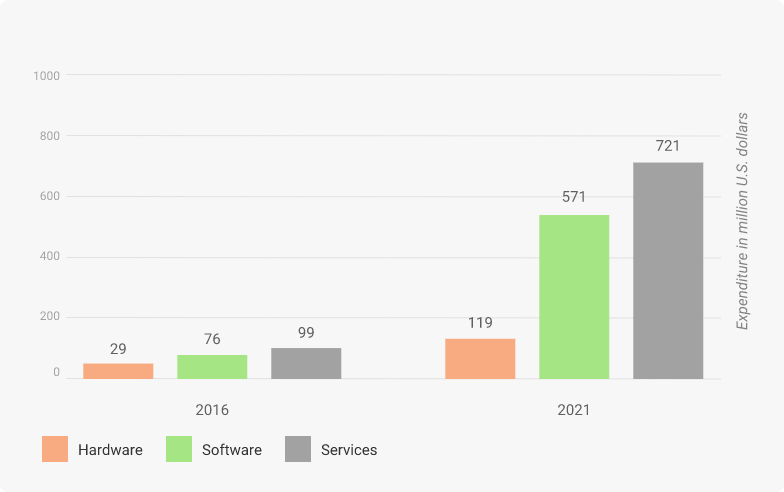
Investments into Cognitive / AI technologies by Insurance Companies Worldwide 2016-2021
While in 2016, insurers from all over the world spent around $76 million on adopting AI technologies. In 2021, they will raise the investments in this area by $571 million, which is a 7.5 times increase. It's expected that the insurance application development will also grow in proportion to the development of this technology in the industry.
AI Transformation Areas in Insurance
While other business areas are actively reaping the benefits from artificial intelligence, insurance providers are yet to unlock the real potential of AI. Regulatory requirements, changing customer expectations, and challenges of transitioning existing infrastructures to new technologies are just a few current issues with leveraging AI. Nevertheless, there are multiple entry points and opportunities for the use of AI in insurance in every link of the industry’s value chain.
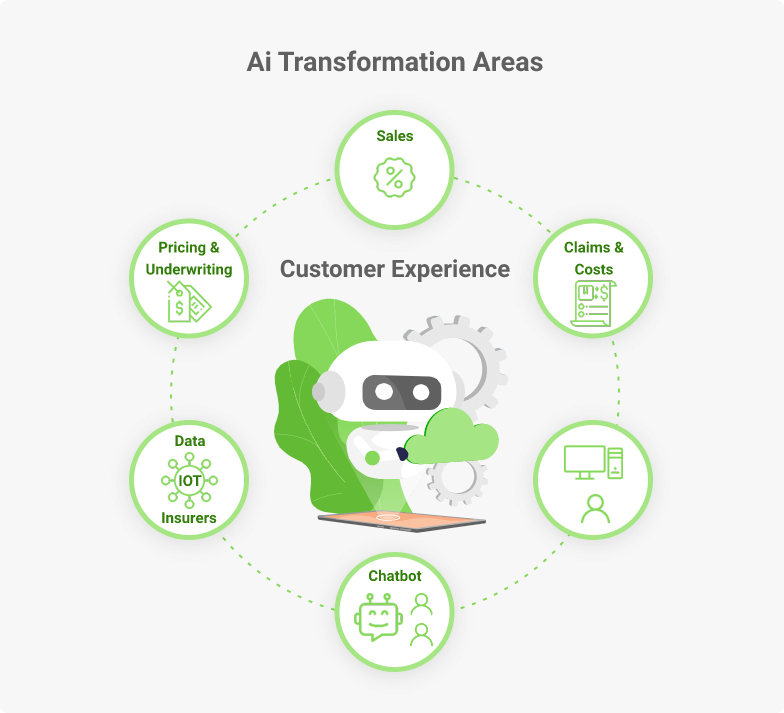
AI Transformation Areas in Insurance
There are three areas for implementing AI technologies on a first-priority basis:
- Pricing and underwriting: adopting AI-driven risk monitoring and underwriting approaches allow improving manual processes or eliminating them. The most popular sample is automating document review and eliminating paperwork. Advanced data analytics with the help of big data and machine learning algorithms can potentially increase pricing efficacy and accuracy.
- Claims and costs: different technologies based on AI help insurance professionals create new workflows to fit customer needs better. For instance, automating claims adjudication and administering personal data can significantly streamline customer service and boost accuracy in claims processing. AI-driven analytical models should be implemented to minimize fraud and reduce financial losses associated with fraud activity.
- Sales:text analytics and NLP technologies may help analyze customer feedback and expectations. Such analysis allows developing more relevant marketing campaigns and launching new products based on the actual demand. Pattern detection techniques can help identify the customer segments for personalized marketing activities to target the desired customer categories.
AI technologies can be applied to any process of the insurance value chain, depending on the needs and priorities of the specific enterprise:
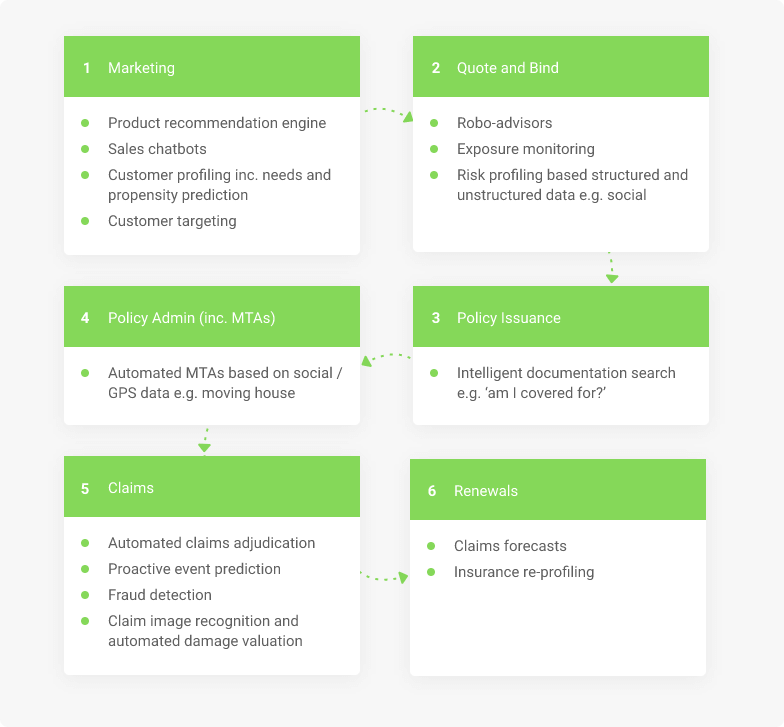
How AI Changes The Insurance Value Chain
AI is one of the biggest game-changers that will transform the insurance industry within the next ten years. However, the proper balance of handling opportunities towards data-related risks will ensure maximum benefit from the available AI technologies.
Integrate AI technologies into your insurance business. KeyUA will help optimize your operations and provide an up-to-date customer experience to your clients.
Contact UsUse Cases of AI in Insurance
One of the biggest roadblocks in adopting AI capabilities is that many insurers do not understand applying them in practice. Here are the actual applications of different AI technologies to illustrate how they can optimize the workflow, user experience, and security in insurance.
1. Text Analytics & NLP
Text analytics helps analyze customer feedback collected in support calls, e-mails, posts on social media, and other channels. The results of this analysis can be used to develop effective marketing campaigns targeting actual customer demands. It can also speed up the response to customer support tickets by automated response generation based on recognized queries.
Text recognition algorithms and machine learning are widely used in optimizing claims management. The system can analyze the claims reports and learn how to process future claims accurately. Further, such automated claim processing engines can substitute for human assistance.
2. Pattern / Anomaly Detection
Pattern recognition plays a crucial role in insurance product development. Deriving patterns for new product options based on customer feedback helps insurers create more targeted products to timely react to the changing customer demands. It also helps segment target audiences based on cluster analysis to focus on the most extensive customer groups. There are a few more valuable use cases:
- Automating customer service by automatic answers to customer inquiries based on past communication history.
- Validating claims by analyzing the external data sources like weather reports, traffic situation reports, news, etc.
- Integrating robotic advisory into portfolio decisions with the aim of automatic market analysis.
- Predicting the workloads based on historical data to prevent breakages in service providing.
3. Recommendation Engine
One of the most potent uses of artificial intelligence in the insurance sector is predictive data analysis combined with machine learning. It enables a recommendation engine that can be used at all links of the value chain:
- Generating product recommendations based on the buying behavior of consumers
- Collecting new sales leads based on analyzing the purchase data
- Suggesting risk categories for clients based on previously filed claims
- Providing guidance for solving customers’ issues based on the clustered historical data of the service
- Generating templates for new claims based on similar historical claim reports
- Enabling advisory services for recommending financial decisions based on the historical data
- Providing recommendations for recruiting new staff based on social network data and available resume pools.
The potential of recommendation engines is unlimited. As such, algorithms continuously improve their performance thanks to self-training capabilities. Moreover, if trained and tested correctly, the error risks are minimum.
4. Speech Recognition
Machines can now recognize human speech transforming it into text for further processing. Based on that, an insurer can automate processing phone calls for customer support. It also allows enabling virtual voice assistants to replace human employees, enhancing security measures to prevent fraud activities, and a lot more.
The advanced speech recognition algorithms can analyze emotions through speech (sentiment analysis) to improve customer service and marketing effectiveness. Even though text chatbots were only available five years ago, you can now implement a virtual voice assistant to completely replicate the interaction with a human manager.
5. Image and Video Analysis
Intelligent image and video analysis can be effectively used for claims processing in auto and retail property insurance. For example, based on the photos and videos made after a car accident, an algorithm can define the damage scope and the amount of compensation upon the policy. There is no need for agents to go to the place, estimate the scope manually and spend days processing the claim. It can all be done automatically within minutes.
Another critical application of graphic analysis in insurance is facial recognition technology, widely used for verification, authentication, and fraud prevention.
AI can provide support at any business stage, extending human specialists' capabilities by limitless data processing power. There are significantly more applications of artificial intelligence in the insurance industry than listed above. Let's see how it works in real examples.
Need AI-powered advancements of your insurance business processes? Consult KeyUA data engineers to define and implement the best solution.
Get In TouchThe Real Experience of Using AI by Insurance Companies
AI requires heavy investments to modify existing insurance infrastructure. The companies focus on critical aspects of their work that need innovations to fuel efficiency and customer satisfaction. It helps optimize the expenses and upgrade gradually, without interruptions to operations. Here are a few real examples of implementing artificial intelligence in the insurance industry.
State Farm
In 2014 State Farm introduced its Pocket Agent app that helps submit auto claims via mobile devices. The company combined mobile technologies and machine learning algorithms to simplify claim processing for its clients.
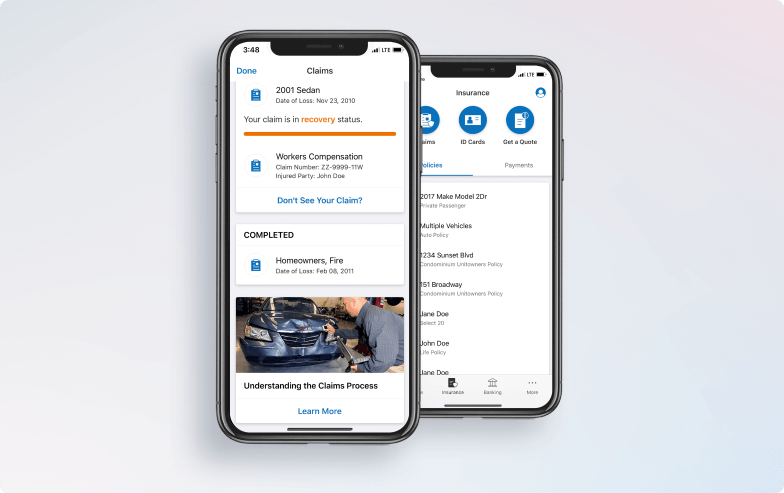
State Farms' Pocket Agent Application
A driver only needs to send the vehicle image; no paperwork is required to file a claim. Additionally, the application allows recording the accident details, selecting repair facilities, managing policies, and online banking through mobile devices.
Beam
Beam decided to use AI and IoT technologies to offer personalized dental insurance. For example, an intelligent toothbrush monitors how well customers take care of their teeth. The collected teeth-brushing information is used to generate customized offers for the suitable insurance plan.

Beam Dental Smart ToothBrush
According to the company’s reports, adopting this algorithm helped them become more competitive on the market by offering up to 25% lower policy rates than their competitors.
O2 Car Insurance
Telematics combined with AI algorithms is widely used in car insurance for offering relevant plans to customers. The technology helps companies offer products more sensitive to personal drivers’ needs. As a result, customers tend to pay insurers for preventive assistance rather than compensating for accident damage, and 02 company was one of the pioneers to offer a product to promote safe driving.
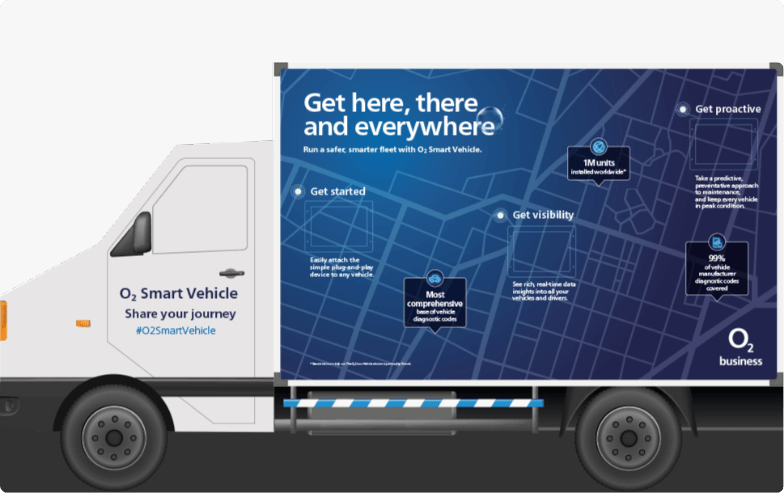
O2 Smart Vehicle
The O2 Smart Vehicle telematics technology offers better pricing for safer driving. A special device tracks the customer’s driving habits, giving users scores for each journey based on the driving quality. These scores can be further transformed into discounts. The O2 application also provides recommendations for safe driving.
Lemonade
One of the most famous InsurTech startups, Lemonade, was valued at $3.9 billion in 2020 during its IPO. It has become a top insurer among younger customer categories due to innovation and speed.
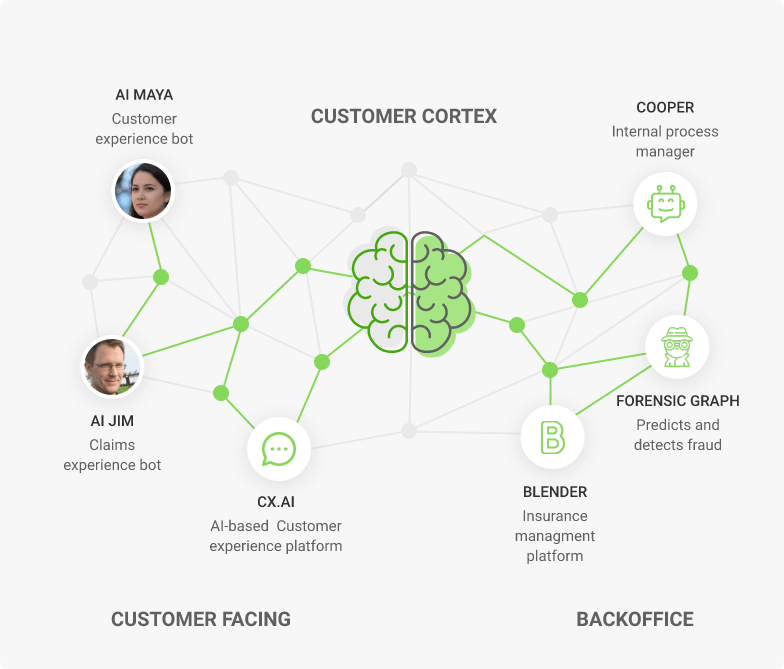
Lemonade AI-based Infrastructure
The company uses chatbots to speed up the acquisition process, improve customer experience, and cut pricing. It is a strong example of how useful AI for insurers can be. In addition, the company managed to undercut bigger competitors and pioneer in-depth AI adoption to provide services without involving humans.
Allstate Insurance
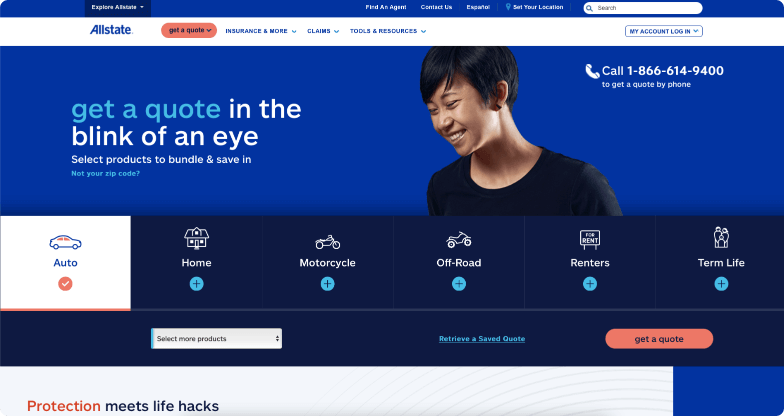
Allstate Insurance applied AI power to a solution against fraud. Greg Firestone, the company’s VP of Data Science, stated, “The best prevention is really being aggressive: using AI and data to find fraud. Data is your friend in this regard. Fraud is a problem that impacts all insurance companies, and we need to focus on it and make sure the fraudsters realize that we’re not easy marks.”
The company’s AI-based solution monitors and flags suspicious claims. The system manages to detect fraud based on existing scenarios. However, it still needs human assistance to learn how to manage the newly appearing threats. Nevertheless, human analysts cannot thoroughly check each instance, so the AI-based algorithm is a big help in fighting fraud. First, the system flags all suspicious claims, and then the team reviews them to verify.
AI Trends Reshaping the Insurance Future
McKinsey’s Insurance 2030 report defines four significant trends of adopting artificial intelligence in insurance:
- Wider use of connected devices: the number of connected consumer devices will grow extensively in the upcoming years. Existing sensors like fitness trackers, smartwatches, and smartphones will be joined by new devices, including eyewear, home appliances, medical devices, smart shoes, etc. The data collected from customers and their properties will help generate more personalized health and property insurance products and provide real-time service delivery.
- Physical robotics: autonomous programmable drones, farming equipment, surgical robots, and other advanced robotic machines will become commercially available by 2025. Self-driving cars will also become standard practice. Insurers will need to adapt to that change, enabling new products and approaches.
- Cognitive technologies: deep learning technologies, including convolutional neural networks, will evolve and penetrate the insurance business. It means new capabilities for personalization, risk assessment and management, and data security.
- Open-source data protocols: digitization dictates requirements to share data across the industries. A common regulatory and cybersecurity network is needed to share data through various public and private entities.
AI will have a revolutionary impact on all aspects of the insurance business. Check our post about the «12 Best Insurance Technology Trends for 2021» to learn more about the upcoming changes in the industry.
Final Thoughts
AI use cases in insurance describe the strong potential for streamlining the processes across the entire value chain. AI is changing insurance towards a digital-first customer experience and generating new product lines based on dynamic customer behavior and personalized demands. Implementing AI-related technology is an investment in a cost-efficient and customer-oriented future at the competitive edge.
The KeyUA team is ready to fuel your insurance business digitization with advanced artificial intelligence capabilities to get the maximum benefit from technological advancements. Let’s empower your insurance business with comprehensive AI solutions!
Would you like to take your insurance agency to a new technical level? Address your requirements to KeyUA software engineers.
Contact Us







 Unit 1505 124 City Road, London, United Kingdom, EC1V 2NX
Unit 1505 124 City Road, London, United Kingdom, EC1V 2NX

Comments
Leave a comment